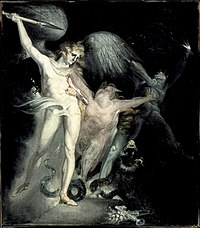Ungoliant
| Ungoliant | |
|---|---|
| Tolkien character | |
| In-universe information | |
| Book(s) | The Silmarillion (1977) |
Ungoliant (Sindarin pronunciation:
Her origins are unclear, as Tolkien's writings do not explicitly reveal her nature, other than that she is from "before the world"; this may mean she is a
Etymology
Ungoliant means 'dark spider' in Tolkien's
Internal history
Tolkien's original writings say that Ungoliant was a primeval spirit of night, named Móru,
Melkor had promised Ungoliant to yield anything she wished in return for her aid, but betrayed this promise by withholding the Silmarils, and summoned the
Analysis

According to the Tolkien scholar John Wm. Houghton, the story of Ungoliant and Morgoth is comparable to the account in John Milton's Paradise Lost in which Sin conceives a child, Death, by Satan. Both Sin and Death are always hungry; Satan says he will feed them, and leads them to the world.[1]
Joe Abbott, writing in
Legacy
Ungoliant has been the subject of several
Ungoliant is mentioned in the 2012 film
References
Primary
- ^ a b Tolkien 1977, ch. 8 "Of the Darkening of Valinor"
- ^ a b Tolkien 1984, ch. 6 "The Theft of Melko"
- ^ a b Tolkien 1977, ch. 9 "Of the Flight of the Noldor"
Secondary
- ^ ISBN 978-1-135-88033-0.
- ^ a b c d e Abbott 1989.
- ^ Boberg, Inger M. (1966). Motif-Index of Folk-Literature. Copenhagen: Rosenkilde and Bagger. G303.3.3.4.2.
- ^ "The Morrigan's Call – Cruachan". AllMusic.
- ^ "The Hobbit: An Unexpected Journey (2012)". Movies Transcript. Retrieved 1 July 2020.
Spiders, Gandalf. Giant ones. Some kind of spawn of Ungoliant, or I am not a Wizard. I followed their trail. They came from Dol Guldur.
Sources
- Abbott, Joe (1989). "Tolkien's Monsters: Concept and Function in The Lord of the Rings (Part 2) Shelob the Great". Mythlore. 16 (2). Article 7.
- ISBN 978-0-395-25730-2.
- ISBN 0-395-35439-0.
